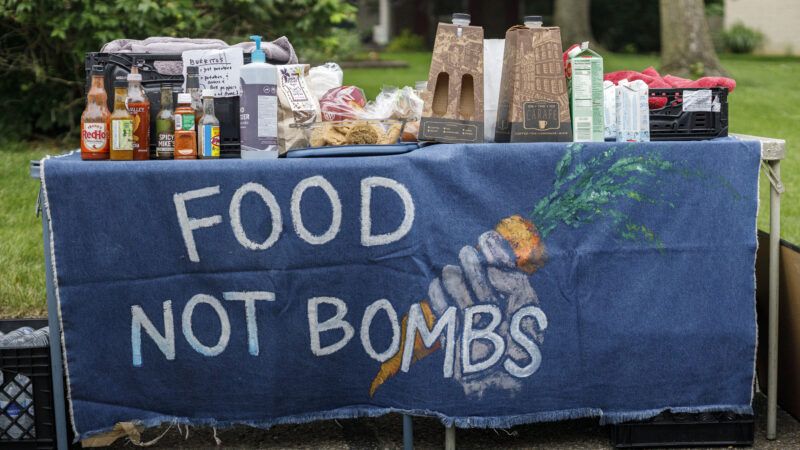Federal Judge Temporarily Blocks Enforcement of Houston Ordinance Against Feeding the Homeless
The judge found that Food Not Bombs' activity was clearly expressive conduct under the First Amendment.

A federal judge this week issued a preliminary injunction against the city of Houston blocking it from enforcing an ordinance that prohibits feeding more than five needy people anywhere—including public property—without permission.
In a ruling issued Wednesday, U.S. District Judge for the Southern District of Texas Andrew Hanen agreed with the Houston chapter of Food Not Bombs (FNBH), a volunteer group that distributes free food in cities worldwide, that the city of Houston's monthslong crackdown on food sharing was not likely to survive constitutional scrutiny.
"While [Houston's] efforts to unify and streamline an efficient end to homelessness and feed the hungry may make good policy sense," Hanen wrote. "being sensible does not always equate to being constitutional, especially when the consequence of that policy is restricting the expressive conduct of those that are protesting government policy."
Houston police began ticketing FNBH and other local activists using the 2012 ordinance last summer. City officials want them to move to an approved parking lot for all homeless services, but the activists say they have a First Amendment right to hand out free food in a downtown public park, where they had been operating without controversy for a decade, with or without the city's permission.
The Texas Civil Rights Project filed a First Amendment lawsuit in January on behalf of FNBH. The suit argues that Houston's anti–food sharing ordinance is unconstitutional both on its face and as applied to FNBH by imposing an invalid prior restraint on the activists' protected First Amendment rights.
According to the Texas Civil Rights Project, Houston police have issued 96 citations for violating the ordinance, which outlaws providing free food to more than five people "in need" at outdoor locations without permission, potentially totaling more than $192,000 in fines.
However, the city's attempts to enforce the ordinance have not gone well. One activist was acquitted, while other cases have been dismissed and delayed because prosecutors can't find jurors who are willing to fine people $500 for the crime of feeding the needy.
In issuing the preliminary injunction, Hanen found that FNBH's food sharing is expressive conduct under the First Amendment and that the group had a substantial likelihood of succeeding on its claims that Houston's ordinance, as applied, creates an unconstitutional prior restraint. Furthermore, Hanen agreed that the ordinance was not narrowly tailored enough, likely making it an unconstitutional time, place, and manner restriction as well.
The ruling is unsurprising; other federal courts have come to similar conclusions. The U.S. Court of Appeals for the 11th Circuit ruled in 2018 that distributing food was "expressive conduct" protected under the First Amendment. That decision was a response to a lawsuit by the Food Not Bombs chapter in Fort Lauderdale.
Randy Hiroshige, a Texas Civil Rights Project attorney, said in a press release that the injunction was "a huge win for our community."
"This is the first step in defending the First Amendment rights of food-sharing organizations in Houston and rejecting the City's cruel ordinance," Hiroshige said. "Feeding our neighbors should not be a crime - Food Not Bombs has done vital work in Houston, and it's time for the City to recognize the real harm this ordinance has caused. TCRP will continue working with Food Not Bombs and community members to ensure that the ordinance is struck down and that all Houstonians in need can access a warm, healthy meal."
Houston city attorney Arturo Michel says in a statement to Reason that Houston Mayor John Whitmire "is committed to working together to resolve differences and agree upon an ordinance that allows expression and provides a safe and healthy environment at the central library and elsewhere for the homeless and their neighbors."
"The judge's order recognized that there were competing interests," Michel says. "Food Not Bombs has a First Amendment right to express its views. The city has an equally important right to ensure public safety and safeguard public health."


Show Comments (11)